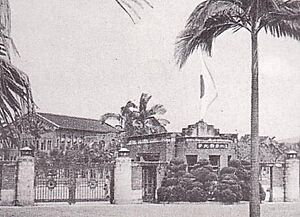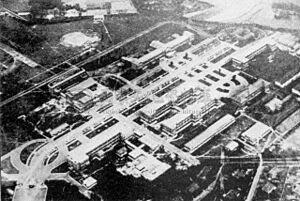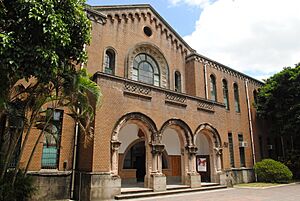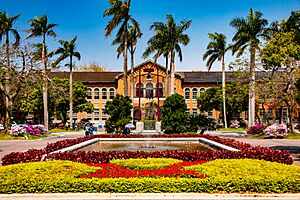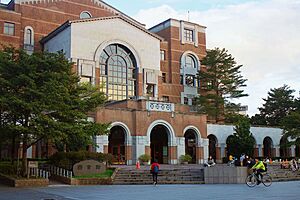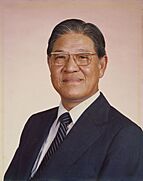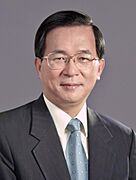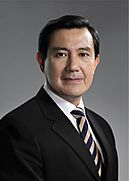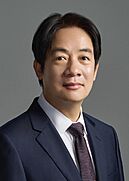National Taiwan University facts for kids
|
國立臺灣大學
|
|||||||||||||||||||||||||||
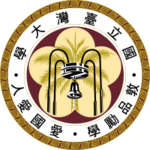 |
|||||||||||||||||||||||||||
|
Former names
|
Taihoku Imperial University (1928–1945) | ||||||||||||||||||||||||||
|---|---|---|---|---|---|---|---|---|---|---|---|---|---|---|---|---|---|---|---|---|---|---|---|---|---|---|---|
| Motto | 敦品勵學,愛國愛人 | ||||||||||||||||||||||||||
|
Motto in English
|
Integrity, Diligence, Fidelity, Compassion | ||||||||||||||||||||||||||
| Type | Public national research university | ||||||||||||||||||||||||||
| Established | March 16, 1928 | ||||||||||||||||||||||||||
| Endowment | $38.6 billion NTD (2024) $1.1 billion USD (2024) |
||||||||||||||||||||||||||
| President | Chen Wen-chang | ||||||||||||||||||||||||||
|
Academic staff
|
2,029 (2020–21) | ||||||||||||||||||||||||||
|
Administrative staff
|
6,765 (2020–21) | ||||||||||||||||||||||||||
| Students | 32,974 (2020–21) | ||||||||||||||||||||||||||
| Undergraduates | 16,773 (2020–21) | ||||||||||||||||||||||||||
| Postgraduates | 12,533 (2020–21) | ||||||||||||||||||||||||||
| 3,668 (2020–21) | |||||||||||||||||||||||||||
| Location |
,
25°00′58″N 121°32′10″E / 25.016°N 121.536°E |
||||||||||||||||||||||||||
| Campus | Urban, 1.6 km2 (0.62 sq mi) (Greater Taipei combined); 344 km2 (133 sq mi) (Nantou County combined) |
||||||||||||||||||||||||||
| Colors | Maroon and Gold | ||||||||||||||||||||||||||
| Affiliations |
|
||||||||||||||||||||||||||
 |
|||||||||||||||||||||||||||
| Chinese name | |||||||||||||||||||||||||||
| Simplified Chinese | 国立台湾大学 | ||||||||||||||||||||||||||
| Traditional Chinese | 國立臺灣大學 | ||||||||||||||||||||||||||
|
|||||||||||||||||||||||||||
| Taihoku Imperial University | |||||||||||||||||||||||||||
| Simplified Chinese | 台北帝国大学 | ||||||||||||||||||||||||||
| Traditional Chinese | 臺北帝國大學 | ||||||||||||||||||||||||||
|
|||||||||||||||||||||||||||
| Alternative Japanese name | |||||||||||||||||||||||||||
| Kanji | 台北帝国大学 | ||||||||||||||||||||||||||
|
|||||||||||||||||||||||||||
National Taiwan University (NTU) is a big public university in Taipei, Taiwan. It's known for its research and is one of the top universities in the country. It was started in 1928 when Taiwan was under Japanese rule. Back then, it was called Taihoku Imperial University. It is the oldest university in Taiwan.
NTU has three main campuses in Taipei and other smaller campuses around Taiwan. Many students attend NTU, including over 16,000 undergraduates and more than 15,000 graduate students. The university offers over 200 different study programs. It has 16 colleges with many departments and research centers. NTU also works with other universities like the National Taiwan University of Science and Technology and National Taiwan Normal University.
Many famous people have studied at National Taiwan University. This includes five presidents of the Republic of China and six vice-presidents. More than 120 members of Academia Sinica (a top research group) and 20 members of the U.S. National Academy of Sciences are also NTU graduates. Some alumni have even won big awards like the Nobel Prize and the Turing Award.
Contents
History of NTU
How it Started (1928–1945)
During the time when Japan ruled Taiwan (1895–1945), Japan set up a modern education system. This included creating universities like those in Western countries. In 1922, a leader named Den Kenjirō suggested building a university in Taiwan. Then, in 1928, the Japanese prime minister helped make it happen.
On March 16, 1928, National Taiwan University began as "Taihoku Imperial University." It was the seventh "Imperial University" in the Japanese Empire. It was the first and only university in Taiwan at that time. Its main goals were to spread Japanese culture and train students for jobs that helped the Japanese government. The first students started classes on May 5, 1928. Most of the early students were Japanese, with a smaller number of Taiwanese students.
At first, the university had two main study areas: Literature and Politics, and Science and Agriculture. Later, they added Medicine in 1935 and Engineering in 1943. The Science and Agriculture area was split into two separate colleges in 1943. The university received money from the Japanese government for research. Most of the teachers and students were Japanese. From 1928 to 1943, about 80% of the students were Japanese and 20% were Taiwanese.
The first president of the university was a Japanese historian named Taira Shidehara. By 1945, the university had five colleges. During World War II, classes were shorter, and the university's activities were limited because of American bombings in Taipei.
Becoming a National University (1945–Present)
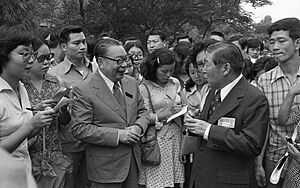
After Japan surrendered in September 1945, the government of the Republic of China (ROC) took over the university. They started making changes to make it more Chinese. A scholar named Lo Tsung-lo was put in charge of changing the university's classes and teaching style. At that time, the university had many teachers and staff, and about 1,767 students. All the Japanese students were sent back to Japan.
The ROC government wanted to change all universities in Taiwan to be like Chinese and American schools. This meant changing how they were run, what they taught, and what degrees they offered. They also wanted to undo the Japanese influence on education in Taiwan. Taiwanese students could now join the university without limits. In November 1945, Taihoku Imperial University was renamed "National Taiwan University." It was reorganized into six colleges: Liberal Arts, Law, Science, Medicine, Engineering, and Agriculture. Students would now study for four years to get a degree.
In the years that followed, National Taiwan University grew quickly. A night school was started in 1955 for adults who wanted to keep learning. A new research library was finished in 1968. More colleges were added, like the College of Management (1987), Public Health (1993), and Electrical Engineering (1997). The law department became the College of Law in 1999, and the College of Life Science was added in 2003. By 2009, NTU had 54 departments, 100 graduate programs, and 25 research centers.
What Students Study at NTU
The main campus of National Taiwan University is in Daan District, Taipei City. NTU also has other campuses around Taiwan. The university owns farms, forests, and hospitals that are used for teaching and research. In total, NTU's land covers a very large area, about one percent of all of Taiwan!
As of 2023, National Taiwan University has sixteen colleges. These include colleges for Liberal Arts, Engineering, Science, Social Sciences, Law, and Medicine. They offer degrees for students at all levels: bachelor's, master's, and doctoral degrees. Students can study many different subjects in science, arts, and humanities. Some subjects, like medicine, electrical engineering, law, and finance, are very popular and hard to get into. Most degrees take four years to finish, but dental and medical programs take six years.
Students can choose from up to 8,000 courses each semester. All undergraduate students must take certain basic classes. These include courses in Chinese, English, physical education, and public service. Medical students also take classes in philosophy, sociology, ethics, and thanatology (the study of death). Military training is no longer required for male students, but it is an option if they want to become officers in the military.
University Connections
NTU is part of several important groups of universities. It is a member of the Association of Pacific Rim Universities and the Association of East Asian Research Universities. These groups help universities work together on research and education. NTU also takes part in programs with Academia Sinica, which is Taiwan's top research organization.
The International Chinese Language Program (ICLP), which helps people learn Chinese, is also located at National Taiwan University. In 2021, NTU started an "International College" especially for students from other countries. All the classes in this college are taught in English.
University Rankings
| University rankings | |
|---|---|
| Global – Overall | |
| ARWU World | 201–300 (2024) |
| CWUR World | 104 (2024) |
| CWTS World | 100 (2023) |
| QS World | 68 (2025) |
| THE World | 172 (2025) |
| THE Reputation | 126-150 (2023) |
| USNWR Global | 233 (2024–2025) |
| Regional – Overall | |
| QS Asia | 21 (2024) |
| THE Asia | 26 (2024) |
| USNWR Asia | 48 (2024–2025) |
How NTU Ranks Globally
National Taiwan University is often seen as the best university in Taiwan. In 2025, it was ranked 68th in the world by the QS World University Rankings. Other rankings also place NTU among the top universities globally. For example, in 2023, it was ranked 187th by the Times Higher Education World University Rankings.
NTU also creates its own ranking of world universities each year.
How NTU Ranks in Different Subjects
NTU is usually ranked number one in Taiwan for most subjects by different ranking systems. For example, in the QS Subject Rankings, NTU is first in Taiwan for many areas like Arts & Humanities, Engineering, Life Sciences & Medicine, Natural Sciences, and Social Sciences & Management. The same is true for the THE Subject Rankings, where NTU is ranked first in Taiwan for all subjects.
Leaders of the University
The university is led by a president. Each college has a dean, and each department has a chairman. Students also elect their own representatives to join important meetings.
Presidents of National Taiwan University
- Chen Wen-chang: January 8, 2023 – present
- Kuan Chung-ming: January 8, 2019 – January 7, 2023
- Tei-Wei Kuo (interim): October 2017 – January 2019
- Yang Pan-chyr: June 2013 – June 2017
- Lee Si-chen: August 2005 – June 2013
- Chen Wei-jao: June 22, 1993 – June 2005
- Kuo Kuang-hsiung: March 1993 – June 1993
- Sun Chen: August 1984 – February 1993
- Yu Chao-chung: August 1981 – July 1984
- Yen Cheng-hsing: June 1970 – July 1981
- Chien Szu-liang: January 1951 – May 1970
- Shen Kang-po: December 1950 – January 1951
- Fu Szu-nien: January 1949 – December 1950
- Chuang Chang-kung: June 1948 – December 1948
- Lu Chih-houng: August 1946 – May 1948
- Lo Tsung-lo: August 1945 – July 1946
Presidents of Taihoku Imperial University
- Kazuo Ando (安藤一雄): March 1945 – August 1945
- Masatsugu Ando: April 1941 – March 1945
- Sadanori Mita: September 1937 – April 1941
- Taira Shidehara: March 1928 – September 1937
Famous People from NTU
Agriculture
Law
Law
Law
Medicine
Many famous people in politics, business, and science have graduated from NTU. Five of the eight presidents of the Republic of China studied there. This includes Lai Ching-te, who is the current president of Taiwan. Also, Tsai Ing-Wen, the first woman president, and Ma Ying-jeou are NTU alumni. Chen Shui-bian and Lee Teng-hui also graduated from NTU.
Six out of the 13 vice-presidents of the Republic of China are NTU graduates. These include Lee Teng-hui, Lien Chan, and Lai Ching-te. Leaders of major political parties, like Eric Chu and Ko Wen-je, also went to NTU.
In science, NTU graduates have achieved great things. Yuan T. Lee won the 1986 Nobel Prize in Chemistry. Andrew Yao received the Turing Award in 2000 for his work in computer science. Other alumni have won the Wolf Prize for their contributions to chemistry and agriculture. For example, Chi-Huey Wong and Shang Fa Yang are notable scientists from NTU.
As of 2024, almost half of all top researchers at Academia Sinica are NTU graduates. Also, 70% of all Taiwanese members of the U.S. National Academy of Sciences studied at NTU. In academics, famous alumni include Chang-Lin Tien, who was the chancellor of the University of California, Berkeley.
Many NTU graduates have also started or led big companies. These include Barry Lam from Quanta Computer and Min Kao from Garmin.
See also
 In Spanish: Universidad Nacional de Taiwán para niños
In Spanish: Universidad Nacional de Taiwán para niños
- National Taiwan University Hospital
- List of universities in Taiwan
- Education in Taiwan
- Wolfgang Kroll
- Imperial Universities
 | James Van Der Zee |
 | Alma Thomas |
 | Ellis Wilson |
 | Margaret Taylor-Burroughs |


